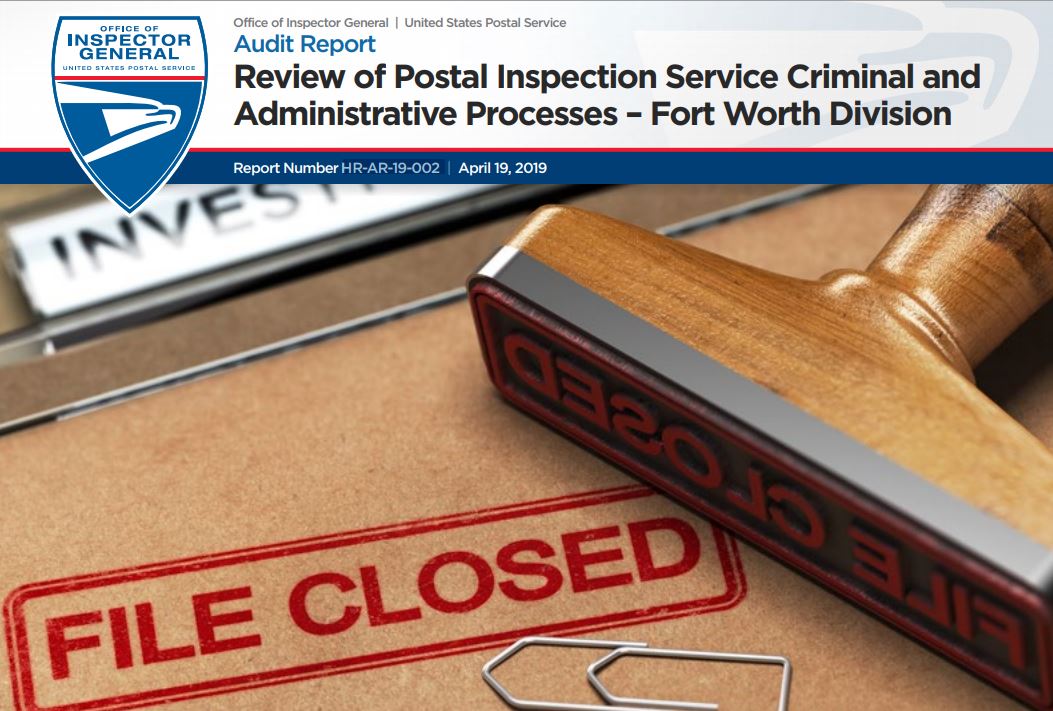Objective
The mission of the U.S. Postal Inspection Service is to support and protect the Postal Service and its employees, infrastructure, and customers; enforce the laws that defend the nation’s mail system from illegal or dangerous use; and ensure public trust in the mail. In fiscal year 2018, the Postal Inspection Service had about 1,300 postal inspectors located in 17 divisions across the nation.
Postal inspectors are federal law enforcement agents responsible for enforcing more than 200 federal statutes that deal with the Postal Service and the U.S. mail. The Office of Inspector General (OIG) has a statutory requirement to provide oversight of activities of the Postal Inspection Service. As such, we plan to conduct similar reviews of other Postal Inspection Service divisions.
Our objective was to assess the U.S. Postal Inspection Service’s compliance with criminal and administrative processes, including the effectiveness of internal controls. Specifically, we reviewed the areas of case management, accountable property, and training in the Fort Worth Division, which was judgmentally selected based on number of investigative cases.
The Fort Worth Division has 46 postal inspectors located in Texas, Arkansas, and Oklahoma. From August 2017 to July 2018, the Fort Worth Division had 299 closed cases — 80 area cases and 219 jacketed cases. Area cases are typically established to conduct preliminary investigative work, whereas a jacketed case is opened when there is indication or occurrence of criminal activity warranting further review.
We reviewed a statistical sample of 55 cases (24 area and 31 jacketed) to determine whether postal inspectors documented investigative activities in accordance with policy. To determine whether arrest details and reporting requirements were met, we reviewed a total of 42 jacketed cases with arrests.
What the OIG Found
The Postal Inspection Service complied with prescribed criminal and administrative policies related to high-value evidence, electronic surveillance, confidential funds, firearms, and threat management training. Processes related to these areas included effective internal controls.
However, we identified areas of noncompliance and opportunities to strengthen internal controls in relation to case management and reporting practices, inventory management, and vehicle authorizations. We identified:
- Postal inspectors did not properly document investigative activities in area and jacketed cases related to investigative summary logs, field notes, and arrest details;
- Postal inspectors did not properly document claimed arrests made by other law enforcement agencies;
- Fort Worth management did not maintain ammunition inventories or track the division’s ammunition usage;
- Fort Worth Division personnel did not conduct annual O key inventories or issue O keys in accordance with policy. O keys access observation areas at postal facilities, thus restricting surveillance activities to law enforcement personnel; and
- Long-term home-to-work authorization justifications for law enforcement vehicles did not meet prescribed criteria.
These conditions occurred because team leaders did not enforce case management policies or conduct comprehensive reviews of case files; there were no formal requirements to inventory or track ammunition; there were no controls to ensure that O key inventories were appropriately conducted; and management decided to override vehicle policy requirements based on circumstances presented by postal inspectors.
What the OIG Recommended
We recommended field management provide refresher training to team leaders, establish a control mechanism to ensure accountability of O keys, reiterate documentation requirements when claiming arrests from outside law enforcement entities, and analyze vehicle authorizations.
We further recommended headquarters management enhance the Closed Case File checklist and the Compliance Self-Assessment and Domicile Review Program to reconcile with case management documentation requirements and establish requirements and processes to inventory and track ammunition.
Read full report
Source: USPS Office of Inspector General

